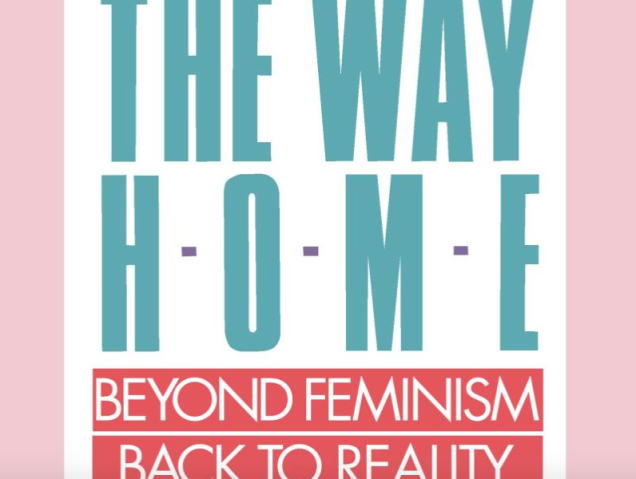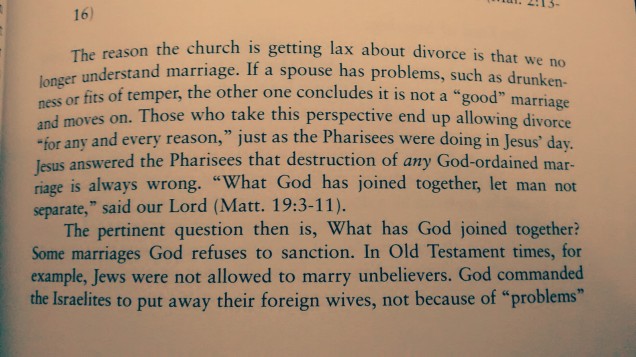Image courtesy of Darcy’s Heart-Stirrings.
HA note: The following is reprinted with permission from Darcy’s blog Darcy’s Heart-Stirrings. It was originally published on March 20, 2015.
< Part Two
I can’t talk about bad Christian marriage teachings without addressing one of the most common ones that tends to lead to all the rest of them. It goes something like this:
“The husband is the head of the family. He is the spiritual leader. He is responsible for the spiritual life and growth of his wife and children. God’s blessings to the family come through the husband and father who is connected to God. A man out of sync with God can take down his family. A woman submits to God by submitting to her husband’s leadership. A woman cannot usurp her husband’s spiritual leadership or God will not bless the family. “
There’s variations of those sentiments, but that’s about the gist of it. A family cannot be a godly family, or a successful family, without the spiritual leadership of a godly man. The requirements for such a man are numerous and many words have been written and spoken and debated about them. Everything from “must lead family worship every day” to “must be active in the church” to “must lead his wife with the Word of God”.
It is clear from most Christian marriage books, conferences, and counseling material that when the man fails in his duty of spiritual leader, the family will also fail. Failure to lead spiritually is the root of all manner of dysfunction and sin in a family. This has caused a lot of women much heartache as they call into Christian radio programs or sit crying with their pastors over their husband’s behavior and character flaws. His sin? “Not being a spiritual leader.” Consider this article from Family Life Today, a program that is considered solid Christian family material, whose founders do marriage conferences around the U.S.:
“How can I motivate my husband to get right with God and become the spiritual leader of our family? This question represents the longing of many wives who are growing in their faith but are married to men whose Christian growth seems stagnant or who seem unwilling to take the spiritual lead in the family. If one of these represents your situation, realize that you are not alone.”
The article goes on to showcase the various popular teachings on what a husband is expected to do and what happens when he isn’t following through. It also goes into the expectations of a wife whose husband is failing at leading. And, in a very predictable manner, blames the wife for her husband’s shortcomings. Because that’s how it always ends up in this paradigm: the wife wasn’t submissive enough, or godly enough, or giving enough sex, or being spiritual enough, or being quiet and meek enough, or she usurped his authority and dared to lead for a bit, and THAT’S why her husband isn’t doing her job. “…carefully evaluate if you are inhibiting your husband’s spiritual leadership by taking the lead yourself….[if] he is instinctively looking to you to set the spiritual atmosphere in the home because of your experience or your spiritual maturity, you may actually be robbing him of the opportunity to become the leader God desires.”Oh noes. Men’s leadership abilites are apparently so fragile as to disappear altogether if the wife doesn’t submit properly. It doesn’t matter if she is actually better equipped than he is, it’s his job and she better not do it, for the sake of their family’s spiritual status.
In another article by Focus on the Family, entitled “How Do I Spiritually Lead My Family?”, the author explains:
“Naturally, there is a great deal of controversy in the church today surrounding the precise meaning of these words. Some husbands wonder, “What am I supposed to do – act like a preacher?” Some wives ask, “Why is he supposed to be the only spiritual leader? Why can’t we both do it?” In the end, it all comes down to a very simple and fundamental truth: families need leaders. The buck has to stop somewhere if the household is to function smoothly and efficiently.”
He then goes on to give out some basic qualifications on what this looks like practically, such as “he must have a strong connection with his Heavenly Father, finding his happiness in Christ first, realizing that he can lead effectively only if he maintains an intimate relationship with the Lord.”
When you get into popular theologians like John Piper and John MacArthur, you get even more specific and deeper into the murk of the teachings on male spiritual leadership. Piper says,
“I define spiritual leadership as knowing where God wants people to be and taking the initiative to use God’s methods to get them there in reliance on God’s power…If we would be the kind of leaders we ought to be, we must make it our aim to develop persons rather than dictate plans. You can get people to do what you want, but if they don’t change in their heart you have not led them spiritually. You have not taken them to where God wants them to be.”
His following list of how to benevolently dictate the lives of everyone under him in the name of God is very long and tedious and I would imagine looks a bit overwhleming to your average husband, father, and church-leader
“What I didn’t realize until recently was just how much my husband was hurting from these teachings. I remember going to church without him one week years ago and listening to a guest speaker rail on the men for not being better leaders, better husbands, and better fathers. (This was his usual sermon when he visited.) How I wished my husband had been there! I confess I thought he could use a good ass-whipping to be the man he wasn’t being (and since I was trying to be the perfect submissive wife, I certainly couldn’t give it to him). When I told him later who spoke, he muttered under his breath “Another guilt-trip for not being a good enough man. Oh yay.” That hit me hard.”
I was so convinced that our marriage wasn’t working, our family was falling apart, and I was being stunted spiritually all because my husband wasn’t interested in spiritual matters. At least, not to the extent that everyone said he should be. I was the woman in the article I posted first, from Family Life Today, wringing my hands because the man who was supposed to be in control of not only my physical life, but my spiritual growth, wasn’t doing his job. I was stuck. I felt hopeless. I had no concept at all that I could be in control of my own spiritual growth or that of my children, no concept of autonomy or agency.
And this brings me to one of the biggest problems with these teachings. They cause women to be stuck. If your man is supposed to be your leader but he’s not leading, and if blessings from God are supposed to come through your man but he’s not doing his job to get the blessings, and if you are told that you must always submit and always respect and never usurp his authority by leading your family yourself because that’s Satan tempting Eve, then what is a woman to do? Well, she manipulates. She jumps through hoops to grovel to her husband’s position over her while still passive-aggressively manipulating her man to do what she wants him to. The much-revered book on marriage, Created to Be His Helpmeet, is an entire book on how a woman can manipulate her man to do what she and God wants while still being a submissive “godly woman”. It becomes the only option left. Real communication cannot happen in such an atmosphere.
Women are inferior in this paradigm because they cannot lead themselves but must depend on a man — a man who is naturally superior in position and spirituality. Though no complementarian teacher will admit this and many protest against the idea, there is no way to operate within this worldview without spiritual and physical inequality between the sexes. They say things like “equal in value but not equal in role”. They can try to redefine “value” all they want but it doesn’t change the practicality that women are inferior in this teaching.
The fact of the matter is, no one is responsible for me except me. No one is my “spiritual leader”. I am my own person with my own beliefs and my own journey and NONE of that is dependent on my husband. Because he is his own person with his own journey too and that’s not dependent on me. We walk our own paths even as we have chosen to walk together. To say that a marriage can only work if the husband is the spiritual leader is ridiculous. Look outside this narrow worldview for one moment and see all the marriages that have worked and are working splendidly without a male leader. Or with the wife leading. Or with one or both of them atheists and no spirituality whatsoever. Or with equal partnerships. Or in Egalitarian Christian marriages. Or in any number of variables and beliefs and situations. Look outside the confines of the cages built by the Complementarian leadership of the American Church and breathe free air for a minute. Then tell me I should go back to a system that says I can’t be anything without my husband’s leadership. That my children will go to hell because he doesn’t go to church or lead prayer or ever talk about God with them, regardless of whether he is a good husband and good father. That it’s probably all my fault the formula isn’t working because it’s always the wife’s fault in this paradigm when her husband isn’t doing his job.
I watch as conservative religious friends go to various marriage seminars where they are instructed on how to have a good marriage within the confines of complementarian teachings. They come back all fired up and high off repenting for not being submissive enough and not being loving enough. But it never lasts. And after a while, back they go to another conference to have it instilled yet again how to operate their relationship in forced, gendered, hierarchical ways. Some manage to last, many don’t. It’s no wonder to me that marriages in these confines need so much encouragement, so many books, yet another conference. Because this type of relationship is not sustainable. Not in a healthy way, not for very long.
Now contrast everything I wrote above with how my marriage is now, years after giving up the teachings of male spiritual leadership. We are equal partners. We are free to use our strengths for the growth of our family without worrying that I’m not being submissive enough or he’s not being leaderly enough. I can call him out when he’s being unreasonable and he can tell me when I’m being a butthead and we can set up boundaries to ensure healthy communication and actions without some weird hierarchical paradigm within which we to try to manipulate each other. We are individual, separate, independent people who adore doing life together and are free to do that in a way that works best for us. I am strong and free to operate my own life and he is free from the burden of treating me as child that needs his direction. We offer each other support, wisdom, criticism, trust, respect, and love. We are not bound by gender roles that force us into unnatural ways of being. We are free. So very free, to be ourselves for each other and for our children. And it is a beautiful thing to behold. Because where freedom lives, love can grow in leaps and bounds.
Once again, giving up saved our marriage. And we didn’t even need a marriage conference to do it.
End of series.







